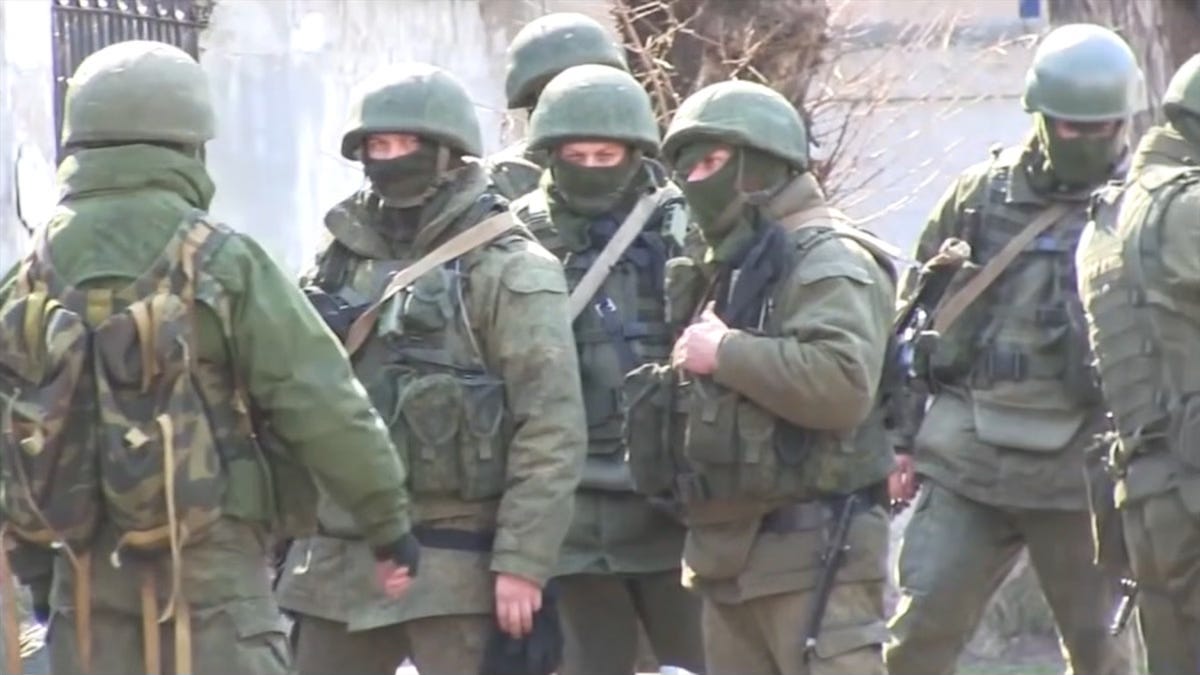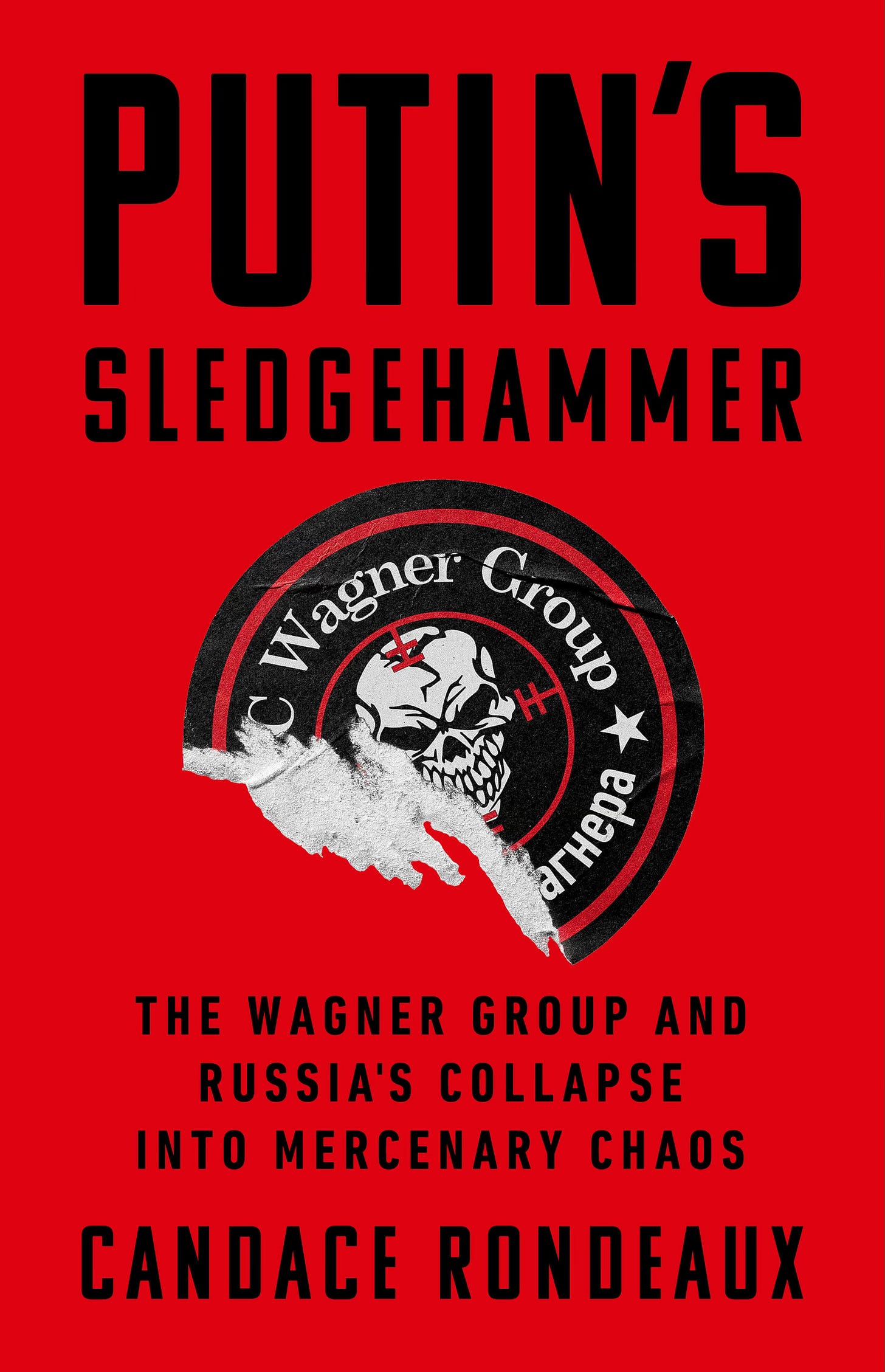An Inside Look at Putin’s Brutal, Bloody Mercenaries from a War Crimes Expert
Candace Rondeaux’s “Putin’s Sledgehammer" chronicles the fortunes of Yevgeny Prigozhin and the Wagner Group
IF AND WHEN VLADIMIR PUTIN FALLS FROM POWER, scholars will examine several key events for signs of his regime’s decline. Chief among them will be the 2022 invasion of Ukraine. But the most serious challenge to his rule since 1999, beside the 2012 protests against the rigged election that returned him to the presidency, was the Wagner Group’s June 24, 2023, uprising and march on Moscow. It exposed deep vulnerabilities in Putin’s power structure and foreshadowed future threats from within. When that reckoning comes, Putin’s Sledgehammer, Candace Rondeaux’s compelling new book on Wagner and its leader, Yevgeny Prigozhin, will be an essential resource.
As a former KGB officer, Putin has long relied on hybrid warfare abroad and the security services at home to suppress dissent and entrench his rule. Early in his presidency, he turned to Prigozhin, a trusted associate from St. Petersburg, to build a covert military-logistics network for Kremlin operations. The result was the Wagner Group, a shadowy force blurring the line between state and private actors that could shield the Kremlin from direct accountability. Over time, Wagner became more than a mercenary outfit—it evolved into a key tool for projecting Russian power in Putin’s confrontation with the West.
Gray Zone
For the first two decades of his rule, Putin sought to further weaken the West without provoking open conflict. Wagner emerged from this strategy, enabling low-cost, deniable operations in Syria, Ukraine, and across Africa. Its success turned Russia into a patron of rogue regimes and helped subvert sanctions, even as it left behind a trail of war crimes.
Putin and Prigozhin first connected in their native St. Petersburg in the twilight of the Soviet Union. Putin had just returned from a KGB posting in East Germany; Prigozhin had just been released from prison after serving time for robbery and assault. After opening a Western-style grocery store, Prigozhin expanded into restaurants, casinos, and alcohol distribution—often with assistance from Putin, who managed business licensing in the corrupt mayor’s office. His upscale venues attracted the city’s elite, including organized crime figures. As Putin rose in politics, he relied on Prigozhin to host foreign dignitaries. After catering an event for George W. Bush in 2003, Prigozhin earned the nickname “Putin’s chef”—and a reputation for discreet effectiveness.
He later proved even more useful. With deep ties to Russia’s criminal underworld and a talent for navigating illicit networks, Prigozhin became a go-to operator. As Putin struggled to reform Russia’s bloated military in the mid-2000s, private military companies emerged as a workaround. Through his Concord holding company, Prigozhin entered government contracting, weapons smuggling, internet influence operations, and paramilitary work. What this gave the Kremlin was a deniable instrument to project power and evade sanctions, with fighters and proxies operating in Georgia, South Ossetia, Abkhazia, Syria, Libya, Sudan, the Central African Republic, Mali, Afghanistan, and Ukraine.
As his empire expanded, so did Prigozhin’s wealth—and his value to Putin. Wagner became a sprawling enterprise, offering war on the cheap while maintaining plausible deniability. Its fighters brought atrocities, criminality, and assassinations in their wake—well earning Prigozhin the “sledgehammer” sobriquet. Meanwhile, his internet operations pioneered the weaponization of social media for disinformation and political interference.
But it was in Ukraine that Wagner emerged from the shadows—setting the stage for Prigozhin’s downfall.
After his army of “little green men” seized Crimea, Wagner supported separatist forces in eastern Ukraine. Then, following the 2014 downing of Malaysia Airlines Flight 17 by Russian-backed fighters, Prigozhin’s propagandists launched aggressive misinformation campaigns and attacks on journalists. By 2022, as Russia’s full-scale Ukraine invasion floundered, Wagner became critical to battlefield operations—recruiting prisoners with promises of freedom and pay. In reality, tens of thousands of Wagner fighters were killed in human-wave assaults against Ukrainian defenses.

Over time, Prigozhin gained public prominence. That gave him a platform to openly accuse Kremlin and military leaders of corruption and negligence. His dramatic criticism culminated in a viral tirade blaming Defense Minister Shoigu and Army Chief Gerasimov for mass casualties:
“And now listen to me you bastards! These are somebody’s fathers. These are somebody’s sons. And the scumbags who are refusing us ammunition will be eating their innards in hell…Where is the fucking ammo? You scum sit there in your expensive clubs. Your kids are getting off on YouTube recording all the details of their little lives…These men came here as volunteers and they’re dying so that you can get fat in your mahogany rich offices.”
Overreach
While Russia’s elite viewed Prigozhin as a growing liability, his popularity among troops and ordinary citizens surged. The conflict came to a head in June 2023, when he ordered 25,000 fighters to march on Moscow. He condemned the war as a sham orchestrated by corrupt elites to deceive both Putin and the Russian people. In a strange twist, the coup appeared aimed not at Putin himself, but at punishing those around him—on his behalf.
What followed was one of the most surreal episodes in modern Russian history. As Wagner advanced, Russian border troops failed to stop them. Putin stayed silent. Security officials were paralyzed. Wagner forces shot down military aircraft sent to intercept them. Only a last-minute deal brokered by Belarusian President Alexander Lukashenko stopped them just hours from Moscow. In over two decades, Putin had never appeared so weak.
When Putin finally addressed the public, he dropped the fiction that Wagner was independent—admitting that the state had funded the group, despite its record of war crimes and assassinations.
Putin needed to reassert control and eliminate Prigozhin—without making him a martyr. For months, Prigozhin continued to travel and act as Wagner’s leader. But his usefulness to the Kremlin had come to an end: He died when the jet he and two top aides were traveling in exploded over central Russia. While the details remain murky, most observers believe Putin ordered his assassination.
Rondeaux’s book is a meticulously researched and richly detailed account of Prigozhin, Wagner, and Putin’s covert war machine. Though dense and complex—perhaps daunting for the casual reader—her ability to illuminate their deliberately hidden networks is striking.
Rondeaux, a former foreign correspondent and bureau chief for The Washington Post who is a recognized expert on transnational crime, asks a pressing question: How long can Russia sustain its shadow army before the world demands accountability?

Ultimately, her book is not just about Russian criminality—it is also a critique of the West’s failure to act. Putin’s “war on the cheap,” built on hybrid warfare and plausible deniability, has long been visible to Washington and its closest allies. Yet Western leaders have often looked away, unwilling to confront the atrocities, sabotage, and subversion orchestrated by Wagner, Prigozhin, and Putin himself.
Price to be Paid
But consequences may come regardless of Western inaction. Back in the late 1980s, unprecedented domestic protests over the deaths of 15,000 Russian soldiers in the Kremlin’s Afghan war presaged the downfall of the Soviet Union. The Ukraine war has claimed many multiples of that—250,000 dead and counting. Russia’s cities and economy are unprepared to absorb tens of thousands of returning, traumatized men. Many, including ex-convicts and addicts, may channel their trauma into violence and unrest. Economic strain will only worsen the reckoning.
Rondeaux’s message is clear: in Putin’s world, everyone is disposable. He may soon find that history won’t spare him either. ###
John Sipher retired in 2014 after a 28-year career in the CIA’s National Clandestine Service, which included serving in Moscow and running the CIA’s Russia operations. He is the co-founder of Spycraft Entertainment and co-host of the podcast, “Mission Implausible.”
Putin’s Sledgehammer: The Wagner Group and Russia's Collapse into Mercenary Chaos Public Affairs, 2025.








It so well written it makes me want to go out and buy the book.
Very good read, least we forget Wagner, in this hyper-involved theatre.